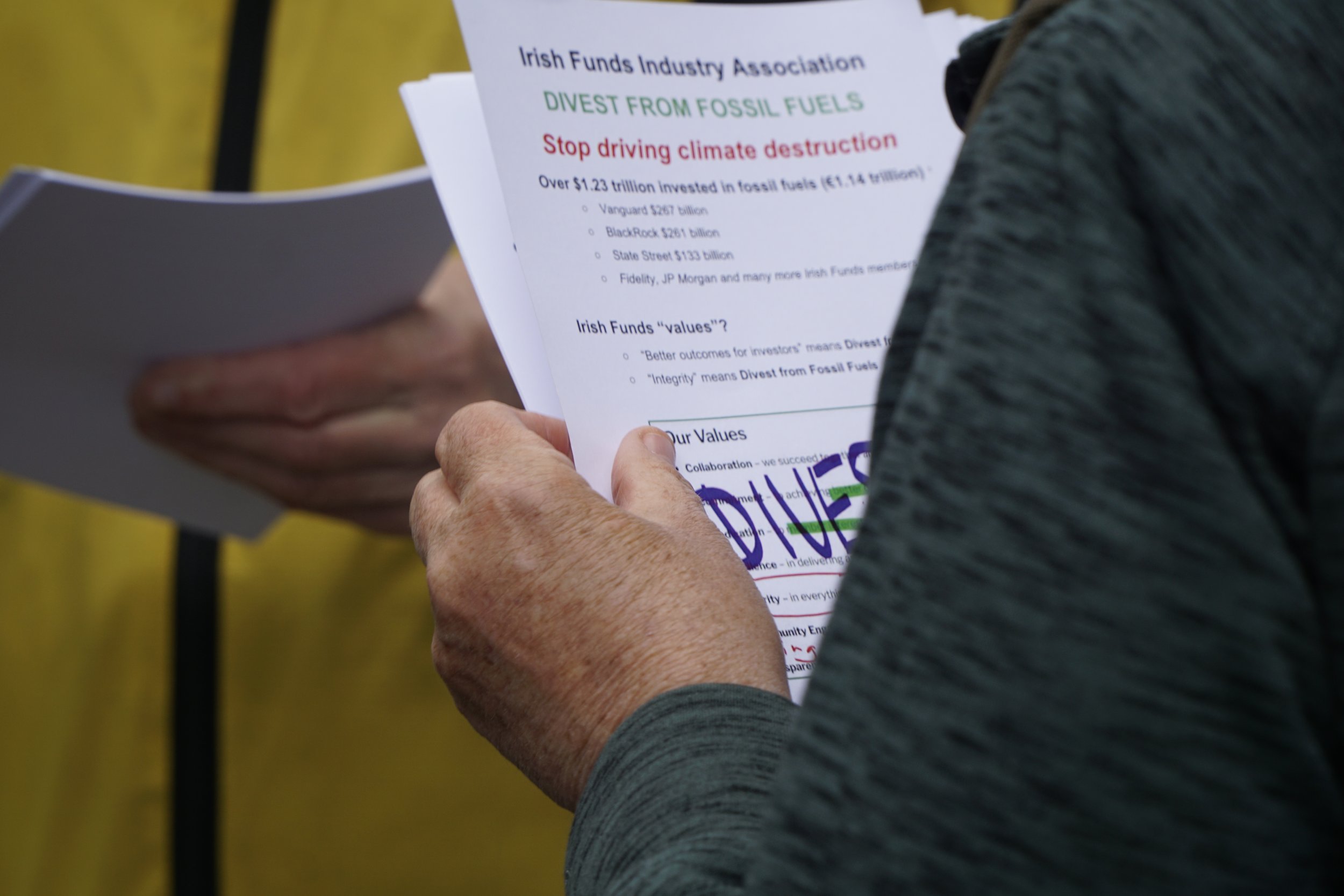By Tom Adams
On Thursday 23 May 2024, XR Ireland protested at the Irish Funds Industry Association Global Conference. This was a follow up to the protest at the Mansion House two weeks previous, targeting the same group. Today the venue was the gilded Royal Dublin Convention Centre on Ship Street. Alas, we were not able to get close to the Convention Centre because, according to the dozens of Gardai present, the street was closed (at least to non-besuited members of the public) due to some other issue, nothing at all to do with XRI, honest. As it turned out, the Convention Centre’s elusive entrance meant that scores of attendees were left ambling around, confusedly consulting Google Maps, allowing us to engage with them. Or allowing us to try. It was amazing how many denied attending the conference at all, almost as if there was something inherently shameful about being part of an industry with over $1.2 trillion squirreled away in fossil fuels. Of course, the excellent suits and dresses gave them away, as did the oversized watches and handbags (not to mention the chain of jet-black Range Rovers being waved into the underground car park). In the end, we started directing them to the conference, provided they took a leaflet with them.
The whole thing felt akin to being a waiter at Davos. Hello, sir, can I interest you in a leaflet? Madam, would you please consider divesting from fossil fuels? Could I beseech you to perhaps not be so complicit in the destruction of the natural world? No? Well, do take a vol-au-vent! In terms of the demographics involved, there seemed to be more men than women, and more bald men than the plentifully hirsute. As a rapidly balding middle-aged man, this was heartening, even uplifting, and for a moment I had an urge to follow them down the hill to the Convention Centre and plough my meagre life savings into Vanguard ($267 billion invested in fossil fuels) or BlackRock ($261 billion) or State Street ($133 billion), all Irish Funds Industry Association members. Then I remembered the Climate Emergency and my two-year-old daughter and the tsunami of suffering rushing towards us (and, in so many places around the globe, already making landfall).
A few of the attendees did talk to us. One woman smilingly pointed out that financial services are doing a huge amount for the energy transition. In the abstract, I suppose, she is correct – in 2023, $1.7 trillion was invested in clean energy whereas a ‘mere trillion’ went towards fossil fuel extraction. But this narrative obscures how the nascent renewables industry is being stunted by much more established fossil fuel companies and their nefarious political operatives who sees the energy transition as an existential threat to their hegemony (the only existential threat that they are prepared to recognise). As such, it is not just that every dollar invested in fossil fuels is one that could have gone into clean energy, it is that this dollar will be actively spent on arresting a renewables revolution which requires $4.5 trillion a year by 2030 for us to have any chance – and it is minute, by this stage – of restricting heating to 1.5C globally. And $1 trillion a year is, after all, still a gargantuan amount, particularly given that the IEA affirmed in 2021 that there can be no more oil, gas or coal development if we are to reach Net Zero by 2050. In this context, casting financial services as an altruistic force is, to say the least, problematic.
And then there was the elegantly attired man who informed us that he originally studied as a meteorologist in France. I wondered if he were an outlier in financial services, perhaps even a double agent, a mole! But then he asked if I was aware of the “scientists out there” who had found no conclusive evidence that climate change was occurring due human-made emissions? Ah, no, I said, no, not really. I told him I was aware of the research that found 99.9% of scientists (across 90,000 studies) in agreement that the Climate Emergency was caused by humans. He smiled, undeterred, and told me that these other ‘scientists’ were being denied a platform on mainstream media. I tried to get to the nub of what he believed himself. It’s not about belief, it’s about facts, he said, with a magnificent lack of irony. He then began telling me about the ‘medieval climate optimum’, a denialist trope about how the earth was warm before and Everything Was Fine. I pointed out that scientists had declared 2023 the warmest year in 125,000 years but this did not move him either. Clearly, his alternative scientists said something different, and the net effect was that he could invest in fossil fuels without troubling his conscience. Or perhaps not: you probably hate me! he said, smiling, as he walked away, and there, for a fleeting second, was the guilt, but unconscious still, and projected outward onto us ‘extremists’ with our flags and leaflets and loudspeaker.
On the morning went. Speeches were made. Leaflets distributed. Conversations had. Who knows what the ‘general public’, on their way to work, made of it. Some filmed on their phones, some stopped to ask what it was all about, some had a visceral negative reaction: I’m fine with my pension, thanks very much, one man said, walking by with his buddy. The world has seen much worse! he added. I told him I admired his confidence. Another man, clearly sickened, told us all to go and get jobs. As if attending climate protests was the kind of thing that only the fecklessly unemployed might do. But then there were others who articulated their support, almost with relief; one or two asked how they could join XRI. It goes without saying that there is more work – an immense amount – needed to collapse the gap between those who are actively involved in climate and those who do not yet recognise the extent of the problem, do not yet identify themselves as the kind of people prepared to act.
Meanwhile, back in the belly of the beast, members of the Irish Funds Industry were highlighting trends and discussing venture capital and doing whatever else investment analysts and asset managers do. It’s all too easy to cast these people as villains, as I have, but we also need them to join us, so this is what I would say: come, everything that you care about is under threat, so place your immense financial power in the service of something bigger than the bottom line. A future worth living in.
Photographs by Thady Trá
Sources
Investing in Climate Chaos - Explore the Data https://investinginclimatechaos.org/data





